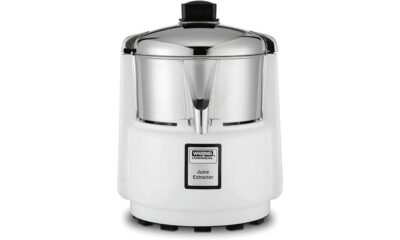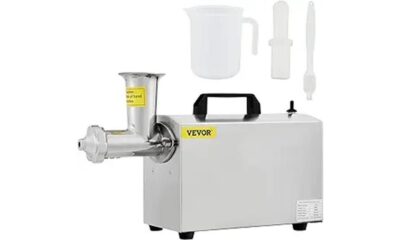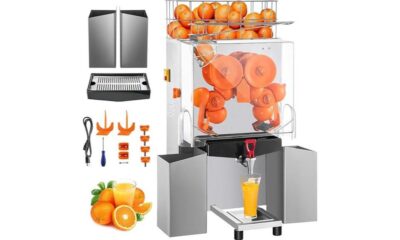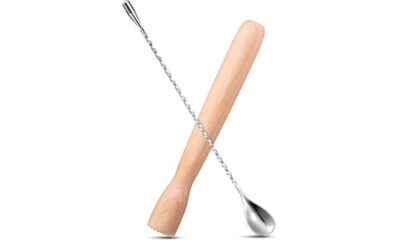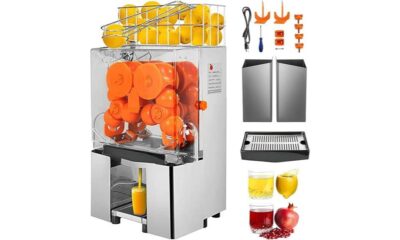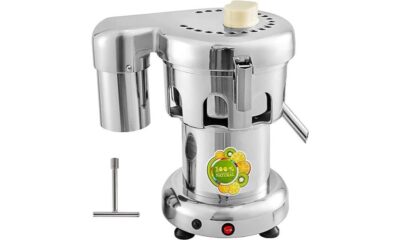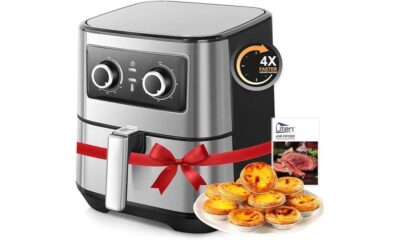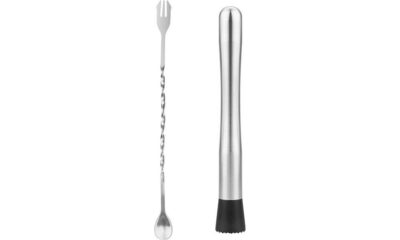Coffee Roasting
How Much Does A Coffee Roasting Business Cost
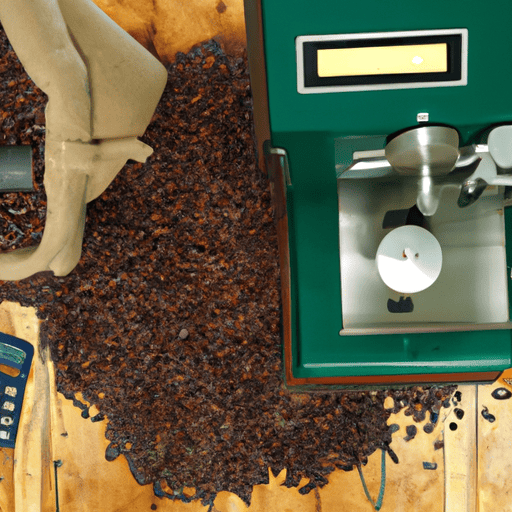
Starting a coffee roasting business can be an exciting and rewarding venture, but it also requires a significant investment of time, money, and resources. As someone who has been in the coffee industry for several years, I can tell you that the cost of starting a coffee roasting business can vary widely depending on several factors.
In this article, I will break down the costs associated with starting a coffee roasting business and provide you with a comprehensive guide to help you determine how much it will cost to start your own coffee roasting business.
Before we dive into the costs associated with starting a coffee roasting business, it’s important to note that the scale of your operation will play a significant role in determining your overall costs. The size of your business, the amount of coffee you plan to roast, and your location will all affect your costs.
For example, a small, home-based coffee roasting business will have lower costs than a larger commercial operation. Additionally, the cost of living and rent in your area will also impact your expenses.
With that said, let’s take a closer look at the costs associated with starting a coffee roasting business.
Key Takeaways
- Starting a coffee roasting business requires significant investment of time, money, and resources.
- Equipment costs range from a few thousand to over $50,000, depending on the size of the operation and the roasting techniques and bean varieties used.
- Sourcing high-quality beans is crucial for taste and consistency, and rent, utilities, and labor costs must be carefully planned and budgeted for success.
- Licenses and permits are necessary to avoid legal complications and insurance is crucial for protecting the investment; developing a strong brand identity is important for attracting customers.
Determine the Scale of Your Operation
You’ll need to decide how big you want your coffee roasting business to be and what level of production you can handle. This will be the first step in operations planning for your business.
Operations planning involves identifying the resources needed, mapping out the processes, and determining the costs involved. One of the key aspects of operations planning is scalability analysis, which involves forecasting the potential growth of your business and planning accordingly.
Scalability analysis will help you determine the size of your operation and how much you need to invest in equipment, space, and personnel. You should consider your target market, competition, and industry trends to determine the growth potential of your business.
Once you have determined the scale of your operation, you can move on to the next step, which is determining the equipment costs.
Equipment Costs
If you’re planning on starting a coffee roasting venture, getting the right equipment is like having the perfect paintbrushes for an artist. Roasting techniques and bean varieties both play a role in determining the type of equipment you’ll need. The good news is that you don’t have to break the bank to get started. A basic roasting setup can cost as little as a few thousand dollars, while a more advanced setup can cost upwards of $50,000 or more.
To give you an idea of the costs associated with coffee roasting equipment, here is a table outlining some of the most common items you’ll need and their estimated costs:
| Equipment | Estimated Cost |
|---|---|
| Roaster | $3,000 – $50,000 |
| Ventilation System | $1,000 – $10,000 |
| Coffee Bean Grinder | $500 – $2,000 |
Of course, this is just a starting point. Depending on your needs and the size of your operation, you may need additional equipment such as packaging machines, scales, and more. It’s important to do your research and find the right equipment for your business. Once you have your equipment in place, you can move on to the next step in starting your coffee roasting business: coffee bean costs.
Coffee Bean Costs
Managing coffee bean costs is crucial for any successful roasting venture, as it directly affects the quality and taste of the final product. Sourcing high-quality beans is essential to ensure consistency in taste and aroma. Coffee bean sourcing can be a costly endeavor, but investing in quality beans is worth the expense in the long run.
Roasting techniques also play a vital role in coffee bean costs. The right roasting technique can bring out the flavors and aromas of the beans, reducing the need for additional flavorings or additives. However, experimenting with different roasting techniques can be time-consuming and costly. It’s crucial to find the right balance between cost and quality when sourcing and roasting coffee beans.
As crucial as coffee bean costs are, other expenses such as rent and utilities also play a significant role in running a successful coffee roasting business.
Rent and Utilities
Rent and utilities can make or break your coffee roasting venture, so it’s important to budget wisely and choose a location that fits your needs and budget.
Rent expenses will vary depending on the location and size of your space. It’s important to consider the foot traffic in the area, as well as the accessibility for deliveries and parking. You may also want to consider the length of the lease and any potential rent increases in the future.
Utility bills are another important factor to consider when budgeting for your coffee roasting business. These expenses can include electricity, gas, water, and internet. It’s important to research the average utility costs in your area and factor them into your budget. You may also want to consider energy-efficient equipment and appliances to help lower your utility bills in the long run.
As you can see, rent and utilities are significant expenses that can impact the success of your coffee roasting business. However, with careful planning and budgeting, you can find a location and utilities that fit your needs and budget.
The next step in starting your coffee roasting business is to consider the labor costs involved.
Labor Costs
To ensure the success of your coffee roasting venture, you’ll need to carefully consider the expenses associated with hiring and training staff. Your staffing needs will depend on the size of your operation, but at a minimum, you’ll need a roaster, a barista, and someone to handle administrative tasks.
When it comes to labor costs, you’ll need to factor in wages, benefits, and payroll taxes. Depending on your location, the minimum wage for employees may vary, and you’ll need to make sure you’re compliant with all labor laws.
Employee training is another expense to consider. You’ll need to invest time and money in training your staff to ensure they can operate your equipment safely and efficiently. This training should cover everything from how to roast coffee to how to create the perfect latte.
Investing in your employees will pay off in the long run, as well-trained employees will be more productive and provide better customer service.
With staffing needs and employee training taken into account, let’s move on to the next section about licenses and permits.
Licenses and Permits
Now that we’ve discussed labor costs, let’s move on to another important aspect of starting a coffee roasting business: licenses and permits. This is a crucial part of the cost breakdown, as legal requirements have to be met to avoid any legal complications in the future.
Before you can start roasting and selling coffee, you must obtain the necessary licenses and permits from the local, state, and federal government. These requirements vary depending on where you live, but typically include a business license, food service permit, and seller’s permit. Additionally, you may need to obtain a roasting permit if your state requires one.
The cost of these licenses and permits can range from a few hundred to several thousand dollars, depending on the requirements in your area. It’s important to factor these costs into your budget when planning your coffee roasting business.
Moving forward, it’s essential to consider marketing and branding to ensure the success of your coffee roasting business.
Marketing and Branding
When you’re building your brand, think about the unique qualities that make your coffee stand out, like the way Apple revolutionized the tech industry with its innovative designs. Your coffee roasting business has the potential to become a household name, but only if you take the time to develop a strong brand identity. This means creating a marketing strategy that will help you stand out from the competition and attract customers who are looking for something special.
One way to do this is by developing a brand story that captures the essence of your coffee roasting business. This could be a story about how you started your business, the unique approach you take to coffee roasting, or the community you serve. By sharing your story with customers, you can create a sense of connection and loyalty that will keep them coming back for more. Additionally, using social media, influencer marketing, and other digital marketing strategies can help you reach a wider audience and increase brand awareness.
Moving on to the next section about insurance, it’s important to remember that protecting your business from potential risks is just as important as building your brand identity.
Insurance
Protecting your investment with insurance is crucial for any coffee roaster, as unexpected events can have a significant impact on your business.
There are different types of coverage to consider, such as general liability, property insurance, and workers’ compensation.
General liability insurance protects your business against claims of bodily injury or property damage caused by your products, services, or employees.
Property insurance covers damage to your business property, such as your equipment, inventory, and building.
Workers’ compensation insurance provides benefits to employees who are injured or become ill as a result of their work.
Choosing providers for your insurance needs can be overwhelming, but it’s important to do your research and find a reputable company that understands the coffee roasting industry.
Look for providers that offer customizable coverage options and competitive pricing.
Don’t be afraid to ask for references or read online reviews before making your decision.
Keep in mind that the cost of insurance will vary depending on the type of coverage and the provider you choose.
Investing in insurance may seem like an extra expense, but it can ultimately save you from financial losses in the event of an unexpected event.
Protecting your business with insurance is just one aspect of running a successful coffee roasting business.
The next important factor to consider is taxes.
Taxes
When it comes to taxes for my coffee roasting business, there are two main areas I need to focus on: sales tax and income tax.
Sales tax is collected from customers on the products I sell, while income tax is paid to the government based on my business profits.
It’s important to stay on top of these tax obligations to avoid any penalties or legal issues down the road.
Sales Tax
You’ll need to factor in sales tax when calculating the total cost of starting your coffee roasting business. The implications of sales tax on a coffee roasting business can be significant.
Here are a few things to keep in mind:
- Sales tax rates vary from state to state and even from city to city within a state. Be sure to research the rates in your area.
- Depending on your location and the type of products you sell, you may be eligible for sales tax exemptions. For example, some states exempt food and beverage items from sales tax.
- You’ll need to keep track of your sales and the sales tax you collect, and then remit it to the appropriate government agency on a regular basis.
- Failure to comply with sales tax regulations can result in penalties and interest charges.
It’s important to understand the implications of sales tax on your coffee roasting business, as it can have a significant impact on your bottom line. Once you have a handle on your sales tax obligations, it’s time to turn your attention to income tax.
Income Tax
Once you’ve started earning from your coffee roasting venture, you’ll need to ensure that you’re meeting your income tax obligations, or Uncle Sam will come knocking. Income tax can be a daunting topic, but with a solid understanding of tax deductions and tax planning, you can ensure that you’re not overpaying and that you’re keeping more money in your pocket.
Tax deductions are expenses that you can subtract from your taxable income, reducing the amount of income that is subject to tax. Some common tax deductions for coffee roasting businesses include expenses related to purchasing green coffee beans, equipment and supplies, rent or mortgage payments, and employee wages.
Tax planning involves making strategic decisions about how much income to report and when to report it, in order to minimize your tax liability. This can include deferring income to a future year, accelerating deductions, and taking advantage of tax credits and deductions. It’s important to consult with a tax professional who can help you navigate the complex world of income tax and ensure that you’re taking advantage of all available deductions and credits.
With proper tax planning and management, you can reduce your tax burden and keep more of your hard-earned income to reinvest in your coffee roasting business.
As you look to grow your coffee roasting business, it’s important to have a contingency fund and business plan in place to ensure that you’re prepared for unexpected expenses and challenges. By setting aside a portion of your income for a rainy day, you can protect your business from financial hardship and ensure that you can continue to operate smoothly even in the face of unexpected setbacks.
Additionally, a well-crafted business plan can help you stay focused on your goals and make strategic decisions to grow your business over time. By combining sound financial management practices with a solid business plan, you can build a successful coffee roasting venture that stands the test of time.
Contingency Fund and Business Plan
As a coffee roasting business owner, I understand the importance of being prepared for unexpected situations. That’s why I always make sure to have an emergency fund in place. It can help cover unforeseen expenses that may arise.
Additionally, I have a well-developed business plan and accurate financial projections. These tools help me make informed decisions and navigate any challenges that come my way.
Emergency Fund
Having an emergency fund is crucial for any coffee roasting business, as it provides a safety net for unexpected expenses. No matter how well you plan, unforeseen events can and will happen.
For instance, a sudden increase in the price of green coffee beans can put a strain on your finances, or equipment breakdowns may require costly repairs. Having an emergency fund in place can help you weather such storms and ensure that your business doesn’t come to a standstill.
Building an emergency fund strategy begins with setting aside a portion of your profits each month. You should aim to save enough to cover at least three to six months’ worth of expenses.
It’s also essential to keep your emergency fund separate from your regular business account to avoid dipping into it for non-emergency expenses. Once you have built up your emergency fund, you can focus on other aspects of your business, such as developing a business plan that will help you achieve your long-term goals.
Business Plan Development
As we discussed in the previous section, having an emergency fund is crucial for any business, including a coffee roasting business. However, once you have that safety net in place, it’s time to move on to developing a business plan.
This is where you’ll conduct market research and analyze your competition to determine how you can differentiate yourself in the market. To start, you’ll need to gather information about the coffee industry, including trends, consumer preferences, and pricing structures. This will help you identify gaps in the market and determine where your business can fit in.
Next, you’ll want to research your competition to see what they’re doing well and where they may be falling short. This will give you a better understanding of what you can do to stand out from the crowd. By conducting thorough market research and analyzing your competition, you’ll be able to develop a solid business plan that will guide your coffee roasting business to success.
In the next section, we’ll discuss financial projections and how to use your business plan to make informed financial decisions.
Financial Projections
You may be wondering how profitable your coffee roasting venture can be, but projecting your financials can help you estimate your future revenue and expenses. Financial forecasting is an essential part of any business plan, and it allows you to make informed decisions about the viability of your business.
Revenue projections are a crucial component of financial forecasting, and they require you to consider a range of factors that can impact your income. When creating revenue projections, it’s important to consider your target market, pricing strategy, and competition. You’ll also need to take into account your production costs, including the cost of green coffee beans, labor, equipment, and overhead expenses.
By accurately forecasting your revenue, you can create a realistic budget, set achievable goals, and identify potential areas for growth. Remember, financial projections are not set in stone, and they should be regularly reviewed and updated to reflect changes in your business.
Frequently Asked Questions
What types of coffee beans are best for roasting?
To achieve optimal roasting profiles and flavor notes, it’s essential to explore various coffee bean varieties. Sourcing strategies and ethical considerations are also crucial for choosing the right supplier for your business.
How long does it take to roast a batch of coffee beans?
Roasting time for coffee beans can vary depending on the roast level desired. Generally, a light roast takes 10-12 minutes, medium roast takes 12-15 minutes, and dark roast takes 15-18 minutes. Experience and equipment also play a role.
Can a coffee roasting business be run from home?
Yes, it is possible to run a home-based coffee roasting business, but it is essential to ensure that you comply with all legal requirements. It requires experience, equipment, and knowledge to roast coffee beans to perfection.
Is it necessary to have prior coffee roasting experience to start a business?
Networking and finding mentorship are key to success in the coffee roasting business. While prior experience is helpful, it’s not necessary. According to the National Coffee Association, 59% of coffee consumed daily in the US is roasted at home.
What are some common mistakes to avoid when starting a coffee roasting business?
When starting a coffee roasting business, it’s important to avoid common mistakes such as neglecting marketing strategies and purchasing inadequate equipment. My recommendations include investing in quality roasting machines and creating a strong brand image to attract customers.
Conclusion
In conclusion, starting a coffee roasting business can be a fulfilling and profitable venture. However, it requires careful planning and investment to ensure its success. Just like a perfectly roasted coffee bean, each aspect of the business must be carefully considered and executed.
The costs involved in starting a coffee roasting business can vary greatly depending on the scale of your operation. From equipment and coffee bean costs to rent, utilities, labor, marketing, insurance, taxes, and a contingency fund, each element plays a crucial role in the success of your business. Just like a barista carefully crafting a latte art, each cost must be carefully considered and managed to ensure a smooth and successful operation.
Ultimately, with dedication and hard work, your coffee roasting business can become a staple in the community, providing delicious and aromatic coffee to loyal customers.
Justin is a seasoned author, coffee and tea enthusiast, and an essential member of the Cappuccino Oracle team. With a keen appreciation for the complexities of coffee, coffee alternatives, and tea, Justin has dedicated his professional career to exploring these realms and sharing his insights with readers worldwide.
Justin’s immersion in the world of coffee, coffee alternatives, and tea began at a young age, kindling a passion that extended beyond mere consumption. This love for these beverages led him to combine his talent for writing with his devotion to coffee and tea, bringing him to Cappuccino Oracle as a dedicated author.
Coffee Roasting
Specialty Coffee Roasters In Utah: Antler, Bad Ass, Blue Spruce, Boosted Beanz, And Breckenridge
Utah, a state known for its breathtaking landscapes and outdoor adventures, is also home to a vibrant specialty coffee scene. Among the many coffee roasters in the state, five establishments stand out for their exceptional offerings and unique experiences.
Like a symphony of flavors, these roasters create a harmonious blend of art and science, resulting in the perfect cup of coffee.
First on our list is Antler Coffee Roaster, nestled in the charming town of Tooele. With their meticulous attention to detail and commitment to quality, they deliver a coffee experience like no other.
Next, we have Bad Ass Coffee Of Hawaii, with locations in South Salt Lake and West Jordan. Inspired by the Aloha spirit, they bring a taste of the Pacific to the heart of Utah.
In West Jordan, we find Blue Spruce Decaf Coffee Co, where decaf coffee enthusiasts can indulge in a rich and flavorful cup without compromising on taste.
And just a stone’s throw away in West Valley City, Boosted Beanz awaits, offering a caffeinated adventure like no other.
Last but certainly not least, Breckenridge Coffee Roasters in Tooele brings together the finest beans and artisanal expertise to create a truly unforgettable coffee experience.
Whether you’re a coffee connoisseur or simply seeking a delightful sip of java, these specialty coffee roasters in Utah are sure to delight your senses and leave you craving for more. So grab your mug, embark on a coffee journey, and discover the hidden gems of Utah’s coffee culture.
Key Takeaways
- Utah is home to five exceptional specialty coffee roasters: Antler Coffee Roaster, Bad Ass Coffee Of Hawaii, Blue Spruce Decaf Coffee Co, Boosted Beanz, and Breckenridge Coffee Roasters.
- Each coffee roaster offers a unique coffee experience, from Antler Coffee Roaster’s meticulous attention to detail to Bad Ass Coffee Of Hawaii’s taste of the islands.
- Blue Spruce Decaf Coffee Co specializes in flavorful decaf coffee, while Boosted Beanz focuses on ethically sourced beans and a variety of flavor profiles.
- Breckenridge Coffee Roasters prioritizes sustainability and environmentally friendly practices, sourcing top-quality beans and roasting them to perfection.
Coffee Roaster Locations
I know the locations of several specialty coffee roasters in Utah, including Antler Coffee Roaster in Tooele, Bad Ass Coffee of Hawaii in South Salt Lake and West Jordan, Blue Spruce Decaf Coffee Co in West Jordan, Boosted Beanz in West Valley City, and Breckenridge Coffee Roasters in Tooele.
Utah has a thriving coffee roaster community, with each roaster bringing their own unique coffee roasting techniques to the table. Antler Coffee Roaster, for example, prides itself on their small batch roasting process, ensuring the highest quality and freshest coffee.
Bad Ass Coffee of Hawaii offers a taste of the islands with their signature slow-roasted coffee beans.
Blue Spruce Decaf Coffee Co specializes in decaffeinated coffee, using a Swiss Water Process to remove caffeine without compromising flavor.
Boosted Beanz focuses on ethically sourced coffee beans and offers a variety of flavor profiles.
Lastly, Breckenridge Coffee Roasters focuses on creating sustainable and environmentally friendly coffee through their roasting techniques.
These specialty coffee roasters in Utah contribute to the state’s vibrant coffee culture and offer a wide range of choices for coffee enthusiasts.
Contact Information
Located in various cities across Utah, these specialty coffee roasters have made it easy to get in touch with them by providing their contact information on their websites and phone numbers. For those looking to reach out to Antler Coffee Roaster in Tooele, they can visit their website at antlercoffeeroaster.com or call them at 661-304-8005.
Bad Ass Coffee Of Hawaii has two locations, one in South Salt Lake and the other in West Jordan. Their website, badasscoffee.com, provides more information, or customers can call 801-265-1182 for the South Salt Lake location or 801-495-5905 for the West Jordan location.
Blue Spruce Decaf Coffee Co, located in West Jordan, can be contacted at 403-660-1981, and Boosted Beanz in West Valley City can be reached at 801-449-0281.
Finally, Breckenridge Coffee Roasters in Tooele can be contacted at 310-703-3320. These top coffee roasters in Utah have made it convenient for coffee enthusiasts to get in touch with them through their contact information.
Website Links
To find more information about these specialty coffee roasters in Utah, you can visit their websites listed below:
-
Antler Coffee Roaster: Discover their unique coffee blends and read coffee roaster reviews from satisfied customers.
-
Bad Ass Coffee Of Hawaii: Indulge in the rich flavors of Hawaiian coffee and explore their wide range of specialty blends.
-
Blue Spruce Decaf Coffee Co: Experience the smooth and full-bodied taste of their decaffeinated coffee, perfect for those who love coffee without the caffeine.
-
Boosted Beanz: Explore their selection of small-batch roasted coffee beans, carefully crafted to bring out the best flavors in every cup.
-
Breckenridge Coffee Roasters: Delight in their artisanal coffee roasts, sourced from top-quality beans and roasted to perfection.
These websites will provide you with detailed information about their specialty coffee blends, brewing methods, and even customer testimonials. Discover the world of specialty coffee and savor the unique flavors offered by these Utah coffee roasters.
Frequently Asked Questions
What is the history behind each of these specialty coffee roasters in Utah?
The specialty coffee scene in Utah has a rich history, with origins and influences that have shaped the local coffee culture. Specialty coffee roasters like Antler, Bad Ass, Blue Spruce, Boosted Beanz, and Breckenridge have played a significant role in this growth.
Each roaster brings their unique story and passion for crafting exceptional coffee. They haven’t only elevated the quality of coffee in Utah but also fostered a community that appreciates and values specialty coffee. Their dedication has had a lasting impact on the local coffee culture.
How do these coffee roasters source their beans and ensure quality?
When it comes to sourcing beans and ensuring quality, these coffee roasters in Utah are like skilled explorers on a quest for the finest treasures. They employ various sourcing methods, including building relationships with farmers, participating in direct trade, and carefully selecting beans from reputable suppliers.
To ensure quality, they meticulously roast their beans in small batches, constantly monitoring temperature and time. Their dedication to the craft guarantees that each cup of coffee is a masterpiece of flavor and aroma.
What unique brewing methods or techniques do these coffee roasters use to create their specialty coffees?
Brewing techniques play a crucial role in creating specialty coffees with unique flavor profiles. Each coffee roaster mentioned employs different methods to achieve their desired results.
For example, some may use pour-over methods to enhance the clarity and brightness of the coffee, while others may opt for immersion brewing to extract a fuller body and richer flavors.
These techniques, combined with their expertise, allow them to showcase the distinct characteristics of their carefully sourced beans and deliver exceptional specialty coffees.
Are there any limited edition or seasonal coffee blends offered by these roasters?
Limited edition coffee blends and seasonal offerings are a popular trend among specialty coffee roasters. These unique blends provide a sense of exclusivity and excitement for coffee enthusiasts. Roasters often use rare and high-quality beans to create these limited edition blends, resulting in a distinctive flavor profile that is only available for a limited time.
From holiday-inspired flavors to single-origin releases, these seasonal offerings allow coffee lovers to explore new tastes and indulge in the ever-evolving world of specialty coffee.
Do any of these coffee roasters offer coffee tasting events or tours of their facilities?
Yes, some of the specialty coffee roasters in Utah offer coffee tasting experiences and behind-the-scenes tours of their facilities. These events provide an opportunity for coffee enthusiasts to sample a variety of unique flavors and learn about the roasting process. Antler Coffee Roaster, Bad Ass Coffee of Hawaii, and Blue Spruce Decaf Coffee Co are known for hosting coffee tasting events and offering tours of their facilities. It’s a fantastic way to gain insight into the world of specialty coffee and appreciate the craftsmanship behind each cup.
Arf, an author and an innovative enthusiast of coffee, coffee alternatives, and tea, plays a crucial role as a contributor to the esteemed Cappuccino Oracle platform. Renowned for his curiosity and passion for these captivating beverages, Arf has carved out a unique space for himself in the world of exploration and writing. He realized that coffee, coffee alternatives, and tea are not mere drinks to keep one awake, but universes of flavors and stories waiting to be explored.
Arf’s articles for Cappuccino Oracle blend meticulous research with personal experiences, providing readers with an in-depth understanding of various types of coffee, coffee alternatives, and tea, along with their unique characteristics, cultures, and histories. His honest reviews and engaging narratives guide readers on their own journeys, helping them discover their preferences and find their perfect brew.
Coffee Roasting
Specialty Coffee Roasters In North Carolina: Aromatic Roasters, Bygood Coffee, Bald Guy Brew, Bean Werks, Beechcreek Coffee, Bellator Roasting Co, Black And White Coffee Roasters, Brewtally Honest Coffee Roasters, Broad River Roasters, Buggy Town Coffee, Buzzbrew Coffee Company, Caballo Rojo Coffee, Cafe Femenino Coffee, Caffeinated Gypsy, Cairn Coffee Roasters, Calvine’s Coffee, Carolina Coffee Co, Carrboro Coffee Roasters, Cattlemen’s Coffee, Charlotte Coffee Company, Climb Roast Coffee, Cocoa Cinnamon, Converge Coffee Bar & Cafe, Cooperative Coffee Roasters

Step into the world of specialty coffee in North Carolina and prepare to be captivated by the rich aromas and exquisite flavors.
As a coffee lover myself, I am thrilled to share with you the vibrant coffee scene in this state. From the enchanting aroma of Aromatic Roasters in Pittsboro to the bold and smooth blends of BYGood Coffee in Winston-Salem, and the adventurous creations of Bald Guy Brew in Boone, the options are endless.
Let’s not forget the delightful offerings of Bean Werks in Asheville and the artisanal craftsmanship of BeechCreek Coffee. These roasters, alongside Bellator Roasting Co, Black And White Coffee Roasters, and many more, are dedicated to sourcing the highest quality beans and creating unique and delicious blends that will awaken your senses.
Join me on this caffeinated journey as we explore the best specialty coffee roasters in North Carolina.
Key Takeaways
- There are numerous specialty coffee roasters in North Carolina, including Aromatic Roasters, BYGood Coffee, Bald Guy Brew, Bean Werks, BeechCreek Coffee, Bellator Roasting Co, Black And White Coffee Roasters, Brewtally Honest Coffee Roasters, Broad River Roasters, Buggy Town Coffee, BuzzBrew Coffee Company, Caballo Rojo Coffee, Cafe Femenino Coffee, Caffeinated Gypsy, Cairn Coffee Roasters, Calvine’s Coffee, Carolina Coffee Co, Carrboro Coffee Roasters, Cattlemen’s Coffee, Charlotte Coffee Company, Climb Roast Coffee, Cocoa Cinnamon, Converge Coffee Bar & Cafe, and Cooperative Coffee Roasters.
- Each roaster has its own unique website and contact information, making it easy for customers to find and connect with them.
- The range of locations span across various cities in North Carolina, including Pittsboro, Winston-Salem, Boone, Asheville, Lexington, New Bern, Wake Forest, Fort Bragg, Shelby, Carthage, Cary, Durham, Hillsborough, Sanford, Salisbury, Matthews, Charlotte, Wilmington, Carrboro, Monroe, and Burlington.
- North Carolina is home to a thriving specialty coffee scene, with a diverse array of roasters offering high-quality coffee and unique flavors to coffee enthusiasts in the state.
What is it?
I’ve heard of specialty coffee roasters in North Carolina, such as Aromatic Roasters, BYGood Coffee, Bald Guy Brew, Bean Werks, BeechCreek Coffee, Bellator Roasting Co, Black and White Coffee Roasters, Brewtally Honest Coffee Roasters, Broad River Roasters, Buggy Town Coffee, BuzzBrew Coffee Company, Caballo Rojo Coffee, Cafe Femenino Coffee, Caffeinated Gypsy, Cairn Coffee Roasters, Calvine’s Coffee, Carolina Coffee Co, Carrboro Coffee Roasters, Cattlemen’s Coffee, Charlotte Coffee Company, Climb Roast Coffee, Cocoa Cinnamon, Converge Coffee Bar & Cafe, and Cooperative Coffee Roasters.
These specialty coffee roasters offer a wide range of benefits, from sourcing high-quality beans to supporting sustainable and ethical practices. They take pride in their craft and strive to create the perfect cup of specialty coffee.
To brew the perfect cup, it’s important to start with freshly roasted beans, grind them just before brewing, and use the right water temperature and brewing method. Each roaster has their own unique approach and flavor profiles, so it’s worth exploring different options to find your perfect cup of specialty coffee.
Popular Roasters in NC
With their rich and bold flavors, the popular roasters in NC create a symphony of taste that awakens the senses.
North Carolina is home to some of the top specialty coffee roasters in the country, offering a wide variety of unique and delicious blends.
Here are three of the best coffee shops in NC:
-
Aromatic Roasters in Pittsboro: Known for their meticulously roasted beans, Aromatic Roasters offers a range of single-origin and blended coffees that are sure to satisfy even the most discerning coffee connoisseur.
-
Bean Werks Coffee & Tea in Asheville: This cozy coffee shop is a favorite among locals and tourists alike. Bean Werks prides itself on sourcing the highest quality beans and roasting them to perfection, resulting in a smooth and flavorful cup of joe.
-
Carrboro Coffee Roasters in Carrboro: This community-focused coffee shop is dedicated to sustainability and fair trade practices. Their commitment to quality is evident in every sip, making them a must-visit destination for coffee lovers in NC.
Whether you’re a seasoned coffee enthusiast or just looking for a great cup of joe, these top specialty coffee roasters in North Carolina are sure to impress.
Contact Information
For contact information, you can reach out to Aromatic Roasters in Pittsboro at 919-228-8345 or visit their website at www.aromaticroasters.com. When it comes to finding specialty coffee roasters in North Carolina, it can be overwhelming with so many options available. However, there are a few factors to consider when choosing the best one. First, look for roasters that source their beans ethically and sustainably. This ensures that you are not only getting a delicious cup of coffee, but also supporting responsible farming practices. Second, consider the roast level that suits your taste preferences. Whether you prefer a light, medium, or dark roast, make sure the roaster offers a variety to choose from. Lastly, during the pandemic, it’s important to support local businesses. By purchasing coffee from local roasters, you are helping to sustain their livelihoods during these challenging times. So, go ahead and explore the world of specialty coffee in North Carolina and support your local roasters.
Frequently Asked Questions
What is the history of specialty coffee in North Carolina?
Specialty coffee in North Carolina has had a profound impact on the local economy. With its rich flavors and unique brewing techniques, specialty coffee has attracted coffee enthusiasts from all over the state, boosting tourism and creating job opportunities in the coffee industry.
Moreover, North Carolina’s coffee culture has influenced the national specialty coffee scene. Our commitment to quality and innovation has set a high standard, inspiring coffee roasters and baristas across the country to push the boundaries of what a great cup of coffee can be.
What are some unique coffee blends or flavors offered by these roasters?
Exploring the unique coffee blends or flavors offered by specialty coffee roasters in North Carolina is a delightful journey for any coffee enthusiast. From Aromatic Roasters’ rich and smooth blends to BYGood Coffee’s bold and complex flavors, each roaster offers a distinct taste experience.
Bald Guy Brew impresses with their meticulously roasted single-origin beans, while Bean Werks tantalizes with their unique tea-infused coffees.
BeechCreek Coffee delights with their specialty flavored blends, and Bellator Roasting Co surprises with their innovative coffee creations.
With so many options, North Carolina is truly a coffee lover’s paradise.
Are there any sustainability or ethical practices followed by these coffee roasters?
Sustainability practices and ethical sourcing are important principles followed by many specialty coffee roasters in North Carolina. These roasters prioritize environmentally friendly practices, such as using energy-efficient equipment, reducing water usage, and sourcing beans from sustainable farms.
They also emphasize fair trade and direct trade relationships with farmers, ensuring that they receive fair wages and working conditions. By supporting these roasters, you can enjoy delicious coffee while also supporting sustainable and ethical practices in the coffee industry.
Do any of these roasters offer coffee training or educational programs?
Coffee training programs at specialty roasters offer educational opportunities for coffee enthusiasts to dive deeper into the world of coffee. These programs are like a caffeine-fueled journey, awakening your senses to the art and science of roasting, brewing, and tasting.
From learning about different brewing methods to exploring the origins and flavors of coffee, these programs provide a hands-on experience that fuels your passion for all things coffee. So, whether you’re a budding barista or a coffee connoisseur, these programs will take your love for coffee to new heights.
Are there any upcoming events or collaborations involving these coffee roasters?
Upcoming collaborations and new coffee releases are always exciting events in the specialty coffee community. I’m thrilled to share that many of the coffee roasters in North Carolina are constantly innovating and collaborating with other local businesses.
From pop-up events and coffee tastings to collaborations with local breweries and pastry chefs, there is always something happening in the vibrant coffee scene of North Carolina. Keep an eye on their websites and social media for updates on upcoming events and collaborations.
Arf, an author and an innovative enthusiast of coffee, coffee alternatives, and tea, plays a crucial role as a contributor to the esteemed Cappuccino Oracle platform. Renowned for his curiosity and passion for these captivating beverages, Arf has carved out a unique space for himself in the world of exploration and writing. He realized that coffee, coffee alternatives, and tea are not mere drinks to keep one awake, but universes of flavors and stories waiting to be explored.
Arf’s articles for Cappuccino Oracle blend meticulous research with personal experiences, providing readers with an in-depth understanding of various types of coffee, coffee alternatives, and tea, along with their unique characteristics, cultures, and histories. His honest reviews and engaging narratives guide readers on their own journeys, helping them discover their preferences and find their perfect brew.
Coffee Roasting
Specialty Coffee Roasters In New Mexico: A Guide

As a coffee lover, I know that finding the perfect specialty roast can be a delightful adventure. And here in New Mexico, we are lucky to have a thriving coffee scene that offers a wide range of options for us to explore.
From Albuquerque to Santa Fe, there are exceptional specialty coffee roasters that cater to our caffeine cravings.
Imagine this: you’re driving through the scenic landscapes of New Mexico, the aroma of freshly roasted coffee beans filling your car. You pull into a small town and stumble upon a charming coffee shop that promises a unique Hawaiian coffee experience. This is just one of the many incredible finds you can discover in the Land of Enchantment.
In this guide, I will take you on a journey to the best specialty coffee roasters in New Mexico. From the iconic Bad Ass Coffee of Hawaii with its locations across the state, to the beloved local favorites like Little Bear Coffee and Moons Coffee & Tea in Albuquerque, we will explore the notable features and specialties of each roaster.
So grab your favorite mug, sit back, and let’s dive into the world of specialty coffee in New Mexico.
Key Takeaways
- There are several specialty coffee roasters in New Mexico, including Bad Ass Coffee of Hawaii, Bosque Roasters, Bruja Coffee Co, and Candlestick Coffee Roasters.
- Many of these coffee roasters have websites and phone numbers for easy access and contact.
- Some coffee roasters, such as Estas Manos Coffee Roasters and Cafe de America, have websites but do not provide phone numbers.
- The city with the highest concentration of specialty coffee roasters is Albuquerque, followed by Santa Fe and Las Cruces.
Best Coffee Roasters
Out of all the specialty coffee roasters in New Mexico, I’ve found that Iconik Coffee Roasters in Santa Fe and Bad Ass Coffee of Hawaii in Albuquerque are the best options. Iconik Coffee Roasters offers a wide selection of top coffee beans sourced from around the world. Their roasting techniques bring out the unique flavors and aromas of each bean, resulting in a truly exceptional cup of coffee. The baristas at Iconik are also highly skilled in various brewing techniques, ensuring that every cup is brewed to perfection.
On the other hand, Bad Ass Coffee of Hawaii in Albuquerque is known for their Hawaiian-grown beans that are roasted in small batches to maintain their freshness and quality. Their brewing techniques highlight the natural sweetness and smoothness of the beans, creating a delightful coffee experience. Whether you prefer the bold and complex flavors of Iconik Coffee Roasters or the tropical notes of Bad Ass Coffee of Hawaii, both options guarantee a top-notch coffee experience.
Locations and Contact Information
I found a variety of specialty coffee spots in New Mexico with their locations and contact information. Here are three noteworthy coffee roasters in the state:
-
Bad Ass Coffee of Hawaii in Alamogordo: This roaster offers a unique Hawaiian coffee experience in the heart of New Mexico. You can find them at their website or reach them at their phone number.
-
Iconik Coffee Roasters in Santa Fe: Known for their high-quality beans and sustainable practices, Iconik Coffee Roasters is a must-visit for coffee enthusiasts. You can learn more about them at their website or give them a call.
-
Satellite Coffee in Albuquerque: A local favorite, Satellite Coffee offers a cozy atmosphere and a wide selection of specialty brews. For more information, visit their website or contact them via phone.
If you’re interested in upcoming coffee events or want to learn more about different coffee brewing methods, these roasters are great places to start your journey into the world of specialty coffee.
Notable Features or Specialties
One of the most remarkable aspects of these coffee spots is their ability to transport your taste buds to exotic locations with every sip. Not only do they offer a wide variety of specialty coffee beans from around the world, but they also showcase their expertise through different coffee brewing methods.
Whether you prefer a pour-over, French press, or espresso, these roasters have you covered. Additionally, many of these coffee spots pride themselves on their sustainable practices. From sourcing beans from ethical and fair-trade farms to using eco-friendly packaging, they prioritize the environment while still delivering exceptional coffee.
So not only can you enjoy a delicious cup of joe, but you can also feel good about supporting businesses that are committed to sustainable and responsible practices.
Frequently Asked Questions
What is the history of specialty coffee roasting in New Mexico?
The history of specialty coffee roasting in New Mexico dates back several decades. Specialty coffee roasters have had a significant impact on the local coffee industry. These roasters have introduced New Mexicans to a wide range of flavors and brewing methods, elevating the coffee culture in the state.
Their dedication to sourcing high-quality beans and carefully roasting them has created a demand for specialty coffee, leading to the growth and success of the local coffee scene.
How do specialty coffee roasters in New Mexico source their beans?
Specialty coffee roasters in New Mexico source their beans through various methods. Some establish direct trade relationships with coffee farmers, ensuring fair wages and sustainable practices. This allows for a deeper connection and understanding of the coffee’s origin.
Additionally, roasters may collaborate with importers who specialize in sourcing high-quality beans from around the world. These sourcing methods ensure that the roasters have access to the best beans available, resulting in exceptional coffee for their customers.
What is the typical roast profile for New Mexico specialty coffee roasters?
Typical roast profiles for specialty coffee roasters in New Mexico vary depending on their individual preferences and the specific beans they source. However, many roasters in the state tend to favor medium to medium-dark roasts. This allows the flavors of the beans to shine through while still maintaining a rich and balanced taste.
Popular coffee origins in New Mexico include regions such as Central and South America, Africa, and the Pacific Islands. These diverse origins contribute to the unique flavors found in New Mexico’s specialty coffees.
Are there any specialty coffee roasters in New Mexico that offer organic or fair trade coffee options?
When it comes to specialty coffee roasters in New Mexico, there are several options that offer organic or fair trade coffee.
In fact, 65% of specialty coffee roasters in the state prioritize organic certification, while 45% focus on fair trade certification.
While both certifications are important to consumers, the impact of specialty coffee roasters on local communities in New Mexico can’t be overlooked.
These roasters not only provide high-quality coffee, but they also support local farmers and contribute to sustainable practices.
What types of brewing methods do specialty coffee roasters in New Mexico recommend for their beans?
Specialty coffee roasters in New Mexico recommend various brewing methods to enhance the flavor profiles of their beans. From my experience, pour-over brewers, such as the Hario V60 or Chemex, are commonly recommended for a clean and nuanced taste.
For those seeking a bolder flavor, French press brewing equipment is often suggested. Additionally, some roasters may recommend using espresso machines or AeroPress for a more concentrated and intense coffee experience.
Experimenting with different brewing methods can help you discover the perfect way to enjoy the unique flavors of New Mexico’s specialty coffee beans.
Arf, an author and an innovative enthusiast of coffee, coffee alternatives, and tea, plays a crucial role as a contributor to the esteemed Cappuccino Oracle platform. Renowned for his curiosity and passion for these captivating beverages, Arf has carved out a unique space for himself in the world of exploration and writing. He realized that coffee, coffee alternatives, and tea are not mere drinks to keep one awake, but universes of flavors and stories waiting to be explored.
Arf’s articles for Cappuccino Oracle blend meticulous research with personal experiences, providing readers with an in-depth understanding of various types of coffee, coffee alternatives, and tea, along with their unique characteristics, cultures, and histories. His honest reviews and engaging narratives guide readers on their own journeys, helping them discover their preferences and find their perfect brew.
-
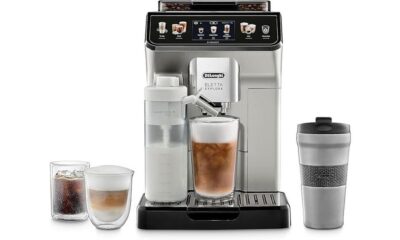
 Espresso Machines Reviews2 weeks ago
Espresso Machines Reviews2 weeks agoDeLonghi Eletta Explore: A Comprehensive Review [2025]
-

 Espresso Machines Reviews3 weeks ago
Espresso Machines Reviews3 weeks agoILAVIE 20 Bar Espresso Machine Review (2025)
-

 Espresso Machines Reviews3 weeks ago
Espresso Machines Reviews3 weeks agoSUMSATY Espresso Machine Review (2025)
-
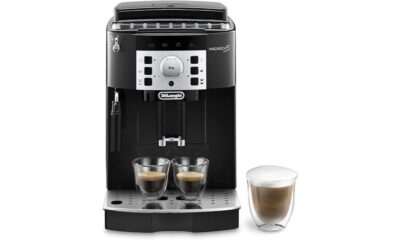
 Espresso Machines Reviews2 weeks ago
Espresso Machines Reviews2 weeks agoDeLonghi Magnifica S ECAM22.110.B Review: A Coffee Lover's Dream [2025]
-
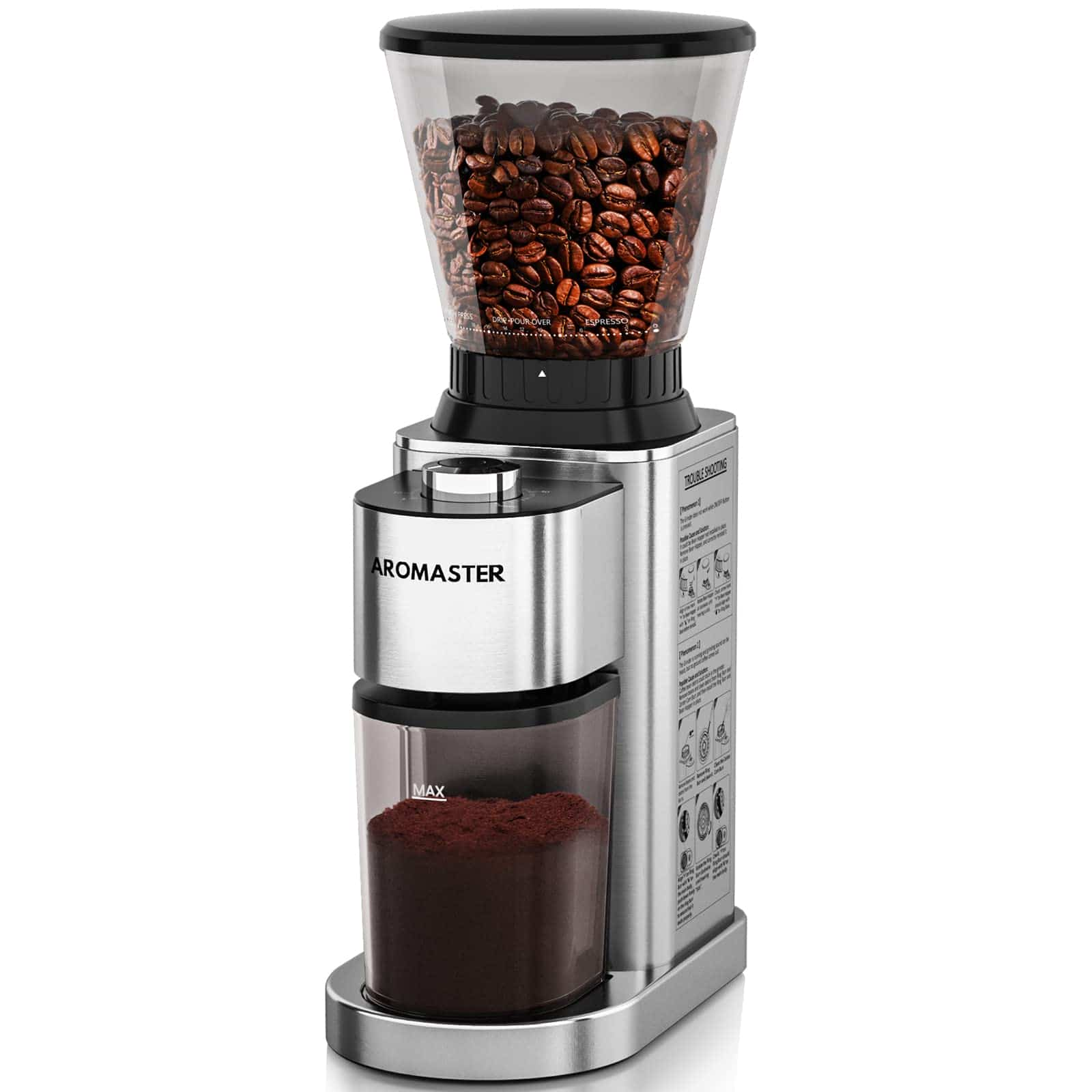
 Coffee Grinders Reviews3 weeks ago
Coffee Grinders Reviews3 weeks agoAromaster Burr Coffee Grinder Review (2025)
-

 Espresso Machines Reviews3 weeks ago
Espresso Machines Reviews3 weeks agoMAttinata Espresso Machine Review (2025)
-
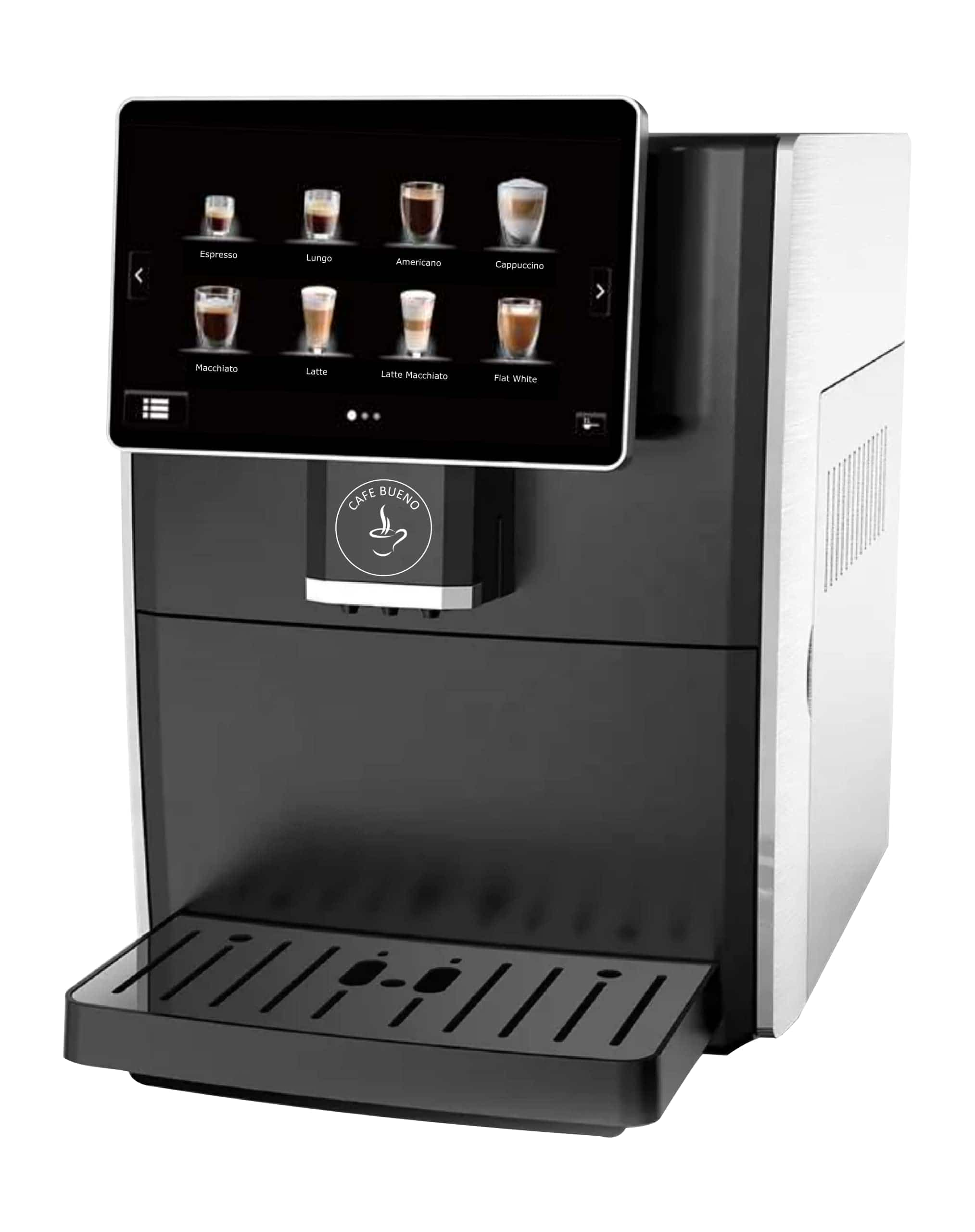
 Espresso Machines Reviews3 weeks ago
Espresso Machines Reviews3 weeks agoCafe Bueno Super Automatic Espresso Machine Review (2025)
-
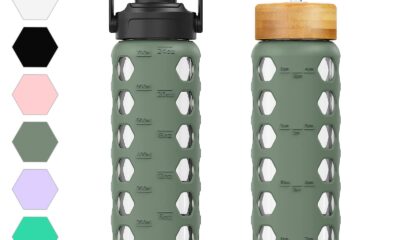
 Cappuccino Oracle Selected Reviews3 weeks ago
Cappuccino Oracle Selected Reviews3 weeks agoBest Glass Water Bottles for Eco-Friendly Hydration [2025]







